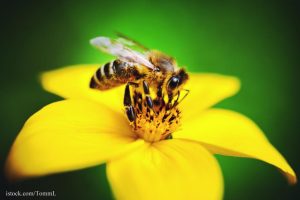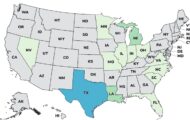A new study published in PLOS One shows that scientists are learning more about the mass bee die-off around the world. Scientists have been puzzled about Colony Collapse Disorder (CCD) that has destroyed 10 million beehives in the past six years.
 According to this new study, it seems that fungicides in combination, which were thought to be “fairly sale” for honey bees, are increasing their susceptibility to an insect gut pathogen called Nosema ceranae. In other words, chemicals and pathogens are interacting to kill the bees at sub-lethal doses. And while farmers are warned to avoid spraying pesticides when pollinating bees are present, such warnings are not on fungicide labels. In addition, the bees are collecting pollen from weeds and wildflowers near farm fields, which raises concerns about drift and agricultural spraying practices.
According to this new study, it seems that fungicides in combination, which were thought to be “fairly sale” for honey bees, are increasing their susceptibility to an insect gut pathogen called Nosema ceranae. In other words, chemicals and pathogens are interacting to kill the bees at sub-lethal doses. And while farmers are warned to avoid spraying pesticides when pollinating bees are present, such warnings are not on fungicide labels. In addition, the bees are collecting pollen from weeds and wildflowers near farm fields, which raises concerns about drift and agricultural spraying practices.
While destruction of habitat, pathogens, and climate change are killing bees, the study found that the insect’s diets, along with parasites, have stronger negative effects on managed honey bee colonies. Beekeepers have been concerned about the Nosema ceranae parasite, which can cause complete colony collapse.
The scientists collected pollen from bee hives that were rented out to manage seven crops to determine what types of chemicals the insects are exposed to, and how those chemical blends affect the bees’ susceptibility to parasites. The crops were apple, blueberry, early and late cranberry, cucumber, pumpkin, and watermelon. They found 35 different chemicals in the pollen, with high fungicide loads.
Researchers fed the collected pollen, which was contaminated with at least nine different fungicides and pesticides, to healthy bees. Those insects were then much less resistant to the Nosema parasite; in fact, they were three times as likely to become infected when their diet contained certain fungicides. The scientists say that “some fungicides have stronger impacts on bee health than previously thought. Nosema infection was more than twice as likely in bees that consumed these fungicides than in bees that did not.”
If bees continue to die at this rate, crops that require them for pollination could become too expensive or impossible to produce. A class of pesticides called neonicotinoids has been linked to bee deaths, but this study showed that the issue is more complicated, and many chemicals in combination may be the cause of this problem. The researchers say that there is an urgent need for more research on pesticide and fungicide synergistic effects on honey bee health.




